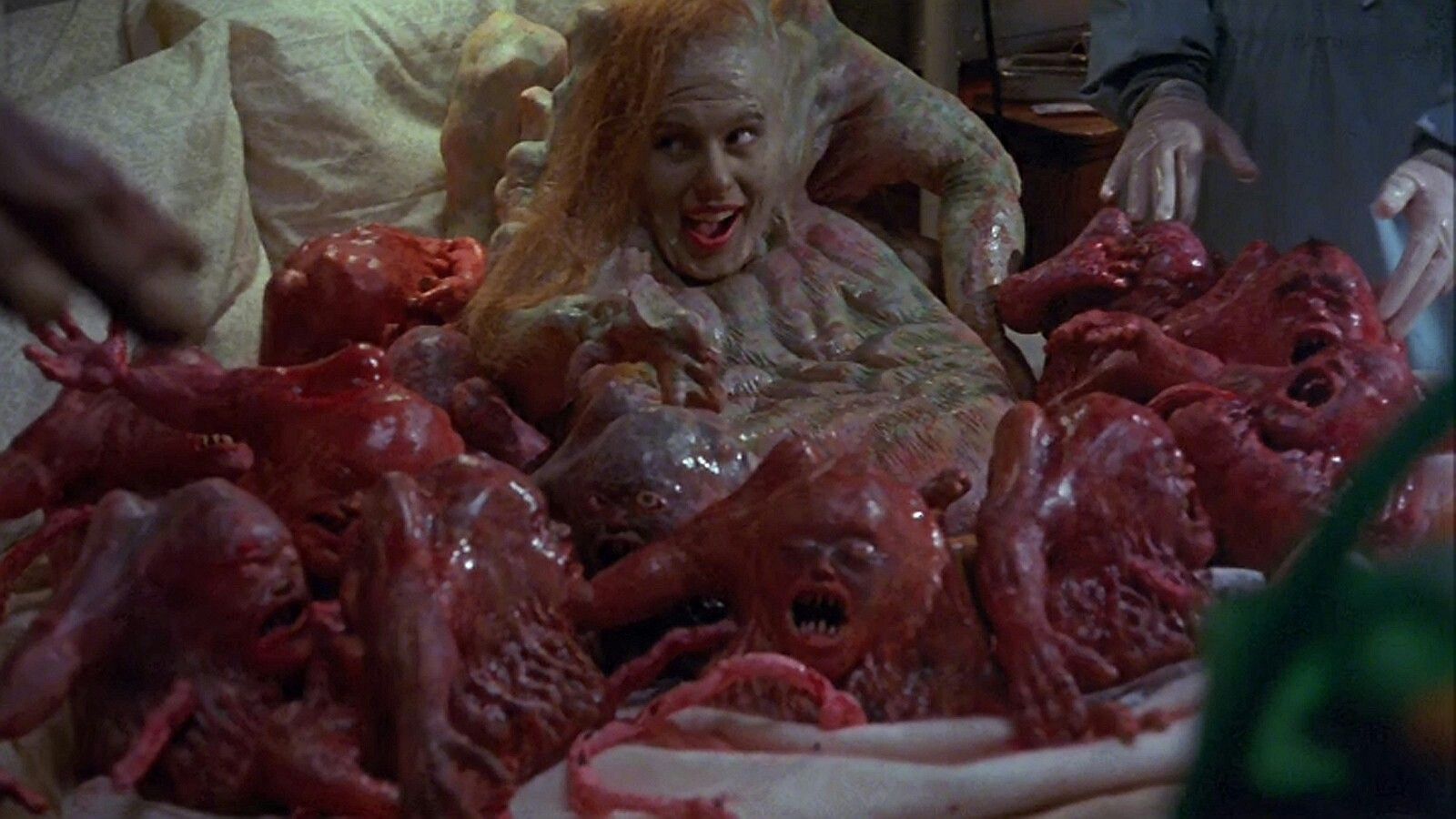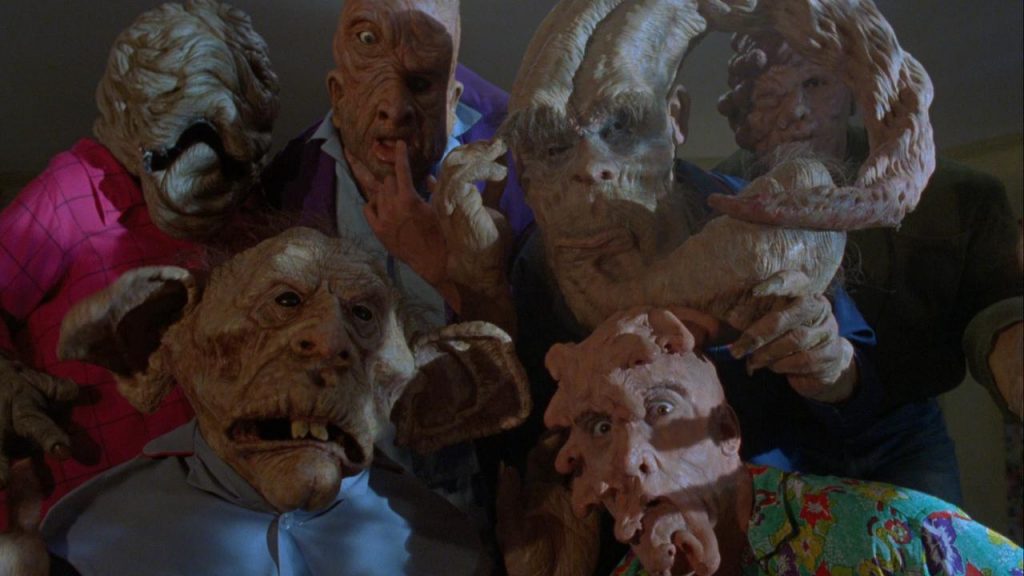 If you freeze-frame in the opening reels of Basket Case 2, a curious thing happens. You can almost – almost – sense the utter surprise on Frank Henenlotter’s part that he’s making a sequel to his surprise grindhouse hit at all.
If you freeze-frame in the opening reels of Basket Case 2, a curious thing happens. You can almost – almost – sense the utter surprise on Frank Henenlotter’s part that he’s making a sequel to his surprise grindhouse hit at all.
At the end of Basket Case, see, it seems that both Duane and Belial are goners: that stark image of them both hanging from the Hotel Broslyn signage and their subsequent plunge to the ground showed us in no uncertain terms that this was meant to be the end of them. So it’s a surprise on many levels that in 1990, they were back – not dead after all, but merely injured. As news footage details their case, some concerned people are watching from home: this interested party knows that the only thing Duane and Belial can do now is go to ground, in a less literal sense, so it’s lucky that they’re ready and willing to help them.
It turns out that ‘Granny Ruth’ (actually jazz singer Annie Ross!) and her granddaughter Susan, living out in Staten Island, run a safe house for other people who are ‘differently bodied’. In fact, the whole house is dedicated to the differently-bodied, resembling a cross between Nightbreed’s Midian and cult kids’ TV show Trapdoor. Let’s just say that the house’s inmates are an interesting looking bunch, and benign enough (amongst themselves at least). This could be Duane and Belial’s big opportunity. Thing is, the press know that Duane and Belial are probably still alive, and they want to track them down; Duane, too doesn’t have to go far along this road before he starts to crave his freedom and a normal life. Things are not going to run smoothly, clearly, so will Duane have to choose his brother, or a new life without him?
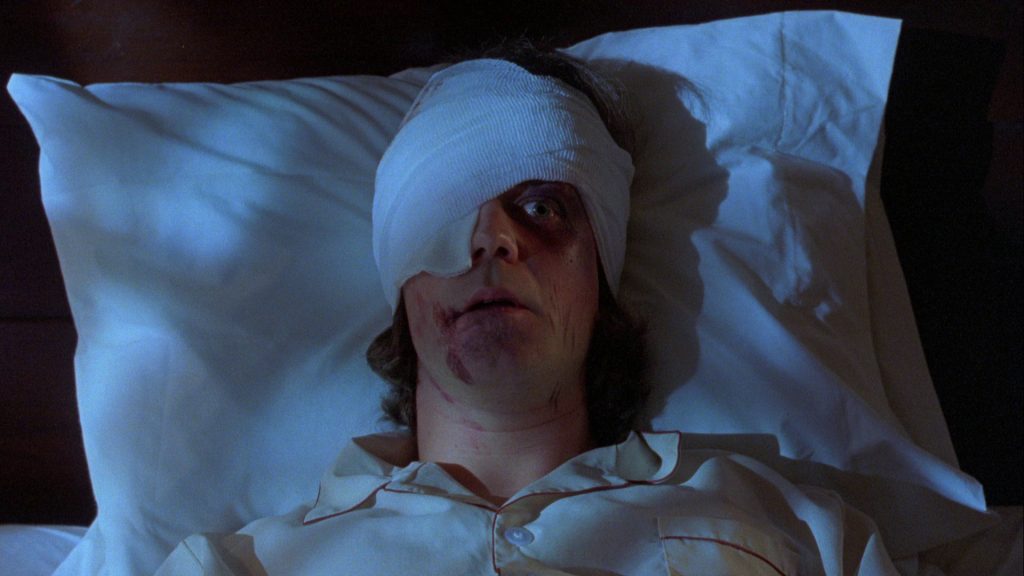 Made in the same year as the uproarious Frankenhooker, Basket Case 2 feels like a perfect blend between opportunism and kicking back – grabbing the chance to make a sequel while the going’s good, but not labouring under any illusions either. Henenlotter is clearly in a mind to go to town on the special effects here, with the result that the film feels to be around 60% latex, and there’s a whole host of new characters being given screen time. Eerily, Belial looks a hell of a lot more like Kevin Van Hentenryck in this incarnation, which somehow makes him look even nastier, even though Van Hentenryck himself has a perfectly amiable face: that lends itself very well to the whole good twin/bad twin thing. In terms of subject matter, things feel a lot more jokey overall in Basket Case 2, but there are still characteristically grim moments. This isn’t a simple moral high ground thing where the poor put-upon ‘freaks’ are mistreated; they aren’t terribly nice to outsiders either, maintaining what seems to be an unspoken Henenlotter mantra: “most people are assholes”, whether or not they have the conventional two arms, two legs, one head.
Made in the same year as the uproarious Frankenhooker, Basket Case 2 feels like a perfect blend between opportunism and kicking back – grabbing the chance to make a sequel while the going’s good, but not labouring under any illusions either. Henenlotter is clearly in a mind to go to town on the special effects here, with the result that the film feels to be around 60% latex, and there’s a whole host of new characters being given screen time. Eerily, Belial looks a hell of a lot more like Kevin Van Hentenryck in this incarnation, which somehow makes him look even nastier, even though Van Hentenryck himself has a perfectly amiable face: that lends itself very well to the whole good twin/bad twin thing. In terms of subject matter, things feel a lot more jokey overall in Basket Case 2, but there are still characteristically grim moments. This isn’t a simple moral high ground thing where the poor put-upon ‘freaks’ are mistreated; they aren’t terribly nice to outsiders either, maintaining what seems to be an unspoken Henenlotter mantra: “most people are assholes”, whether or not they have the conventional two arms, two legs, one head.
“Ripping the faces off people may not be in your best interest.”
By far the best addition to the case in Basket Case 2 is Granny Ruth, however: a strident maternal figure, she combines patient good humour with her charges with a kind of vigilante zeal, doing anything within her power to protect them. All of this looks oddly quaint, coming from someone in smart suits and court shoes. Similarly, granddaughter Susan (Heather Rattray) is the quintessential girl-next-door type, though it transpires – in one of Duane’s many failed romantic encounters – that she has a bizarre characteristic all of her own. You wind up with an odd, homely sort of horror here, shot through with comedy elements and the odd splash of horrific practical-effects heavy gore.
Basket Case 2 happily pushes an already ridiculous premise to its zenith (or so you’d think) by riffing on the same ideas which proved successful in the first film, adding more and more monstrous bodies and behaviours. The hideous sex scenes at the end could even demonstrate some shared lineage with Bad Biology (as could the mutant offspring) but for our purposes here, what they certainly show is that, whatever else he is, Belial is actually more successful with the opposite sex than his brother! Duane decides normality is overrated – possibly, probably as a result of the relationships which have come their way – and he tries to put things back as they were in a spectacularly grisly fashion. This sets things up for the only real place they could go with the next and final Basket Case outing…
“No one is exactly sure what will come out of her…”
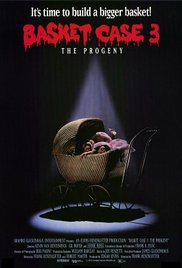 Basket Case 3: The Progeny was made the following year, and wrapped within a month. Being made so close to the last film, it hardly needs the lengthy flashback which harks back to BC2, but what this does make clear is that the memorable sex scene sequence isn’t forgotten yet; it’s going somewhere. We find out that Eve (Belial’s girlfriend) is in the family way, no one’s quite sure what her birth will entail, and Duane has meanwhile been locked in a padded cell for trying to re-attach his brother. These are, by the way, not words you’d ordinarily find yourself typing.
Basket Case 3: The Progeny was made the following year, and wrapped within a month. Being made so close to the last film, it hardly needs the lengthy flashback which harks back to BC2, but what this does make clear is that the memorable sex scene sequence isn’t forgotten yet; it’s going somewhere. We find out that Eve (Belial’s girlfriend) is in the family way, no one’s quite sure what her birth will entail, and Duane has meanwhile been locked in a padded cell for trying to re-attach his brother. These are, by the way, not words you’d ordinarily find yourself typing.
Due to the potentially difficult birth ahead, Granny Ruth and her merry gang are heading off to Georgia to see ‘Uncle Hal’, actually Granny Ruth’s ex-husband: they trust him with this potentially difficult case, so with Duane in tow, they all take a roadtrip – in a converted school bus adapted for such an occasion. Duane, not put off by his amnesia, instability or suspicious lack of a psychic connection with his brother, and certainly not deterred by his utter inability to form workable relationships with women, is more or less instantly prepared to jeopardise the group’s safety by blabbing to a pretty girl he meets along the way…
Duane and his brother’s relationship is pretty fraught, and the big gag here is that all of the freaks seem more level than Duane by this stage: there’s lots here on Duane’s state of mind, even if handled as jokily as everything else in this film. Kevin Van Hentenryck gives his all as ever, and seems to be having fun playing for laughs, even getting close to pratfalling in places. As for Granny Ruth, she ramps up the whole motherly guise even more here, fussing over the new arrivals, transporting her brood in a school bus and even organising a singalong.
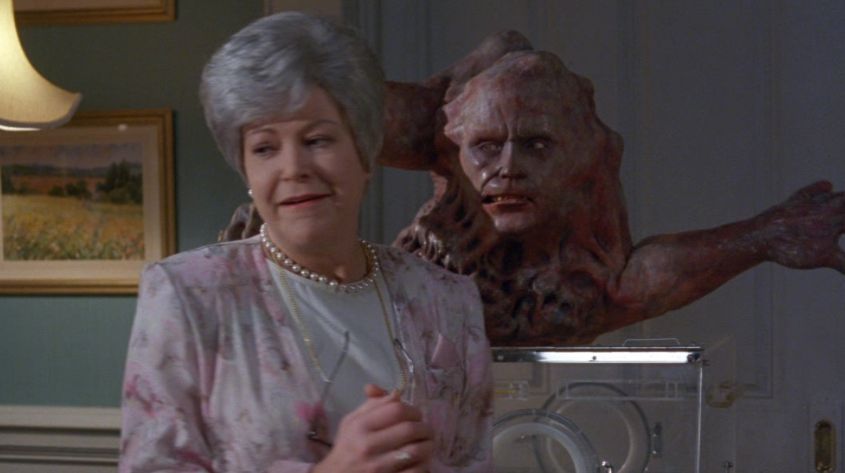 Each successive Basket Case film seems to reach a little higher, from an already lunatic premise, to new heights of creature FX and bizarre ways for these FX to get invoked. For instance, the birth sequence in BC3 is a fun exercise in excess, throwing in catchphrases like “ovarian ovation”, then matching this with a dream sequence for Belial (reprised after the end credits). The last visit to the world of Belial and Duane shows them not as outsiders, railing against the world, but somewhat bewildered members of an extended family group, dealing with family issues. In this respect, BC3 couldn’t be more different to BC; the fact that all of the planned gore was more or less excised from BC3 at the request of the producers further alters the film’s tone, making it generally more playful and allowing it to give the odd nod to other films (the ‘mad inventor’ shtick had just done a turn in Frankenhooker; Belial’s contraption also looks a little like a certain scene in Aliens, though perhaps that’s just me, going a little mad here?)
Each successive Basket Case film seems to reach a little higher, from an already lunatic premise, to new heights of creature FX and bizarre ways for these FX to get invoked. For instance, the birth sequence in BC3 is a fun exercise in excess, throwing in catchphrases like “ovarian ovation”, then matching this with a dream sequence for Belial (reprised after the end credits). The last visit to the world of Belial and Duane shows them not as outsiders, railing against the world, but somewhat bewildered members of an extended family group, dealing with family issues. In this respect, BC3 couldn’t be more different to BC; the fact that all of the planned gore was more or less excised from BC3 at the request of the producers further alters the film’s tone, making it generally more playful and allowing it to give the odd nod to other films (the ‘mad inventor’ shtick had just done a turn in Frankenhooker; Belial’s contraption also looks a little like a certain scene in Aliens, though perhaps that’s just me, going a little mad here?)
Anyway, I for one cannot imagine a jazz number working in BC, whereas it seems to fit in quite neatly in BC3, with an earworm tune played by a proper jazz outfit. Well, moving from a skeezy, grimy exploitation horror, one which Frank Henenlotter didn’t worry too much about because he didn’t expect anyone to actually see it, to a film with a musical number is, I think, a way of showing how much variation eventually crept in to this most unlikely trilogy. The Basket Case films are a variable bunch, true, but they’re each in their way creative and entertaining whilst never creeping too far from the rather grotty characters and ideas which got things started.
